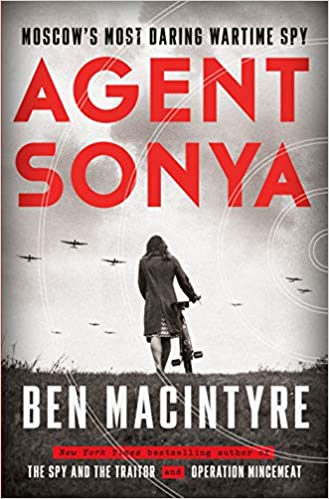Spy for All Seasons
Ben Macintyre has done it again.
Yet another first-rate book on a master spy.
But even more impressive this is a master spy not prominent in general history.
The book focuses on Agent Sonya, a woman who lived throughout 20th century history and represented a dedicated commitment to Soviet communism, even in the face of the ruthlessness of Stalinism.
And an agent who grew into a master spymaster.
She did this while appearing to the world, whether in Asia or Europe, as an uncomplicated housewife with kids at home.
And, oh by, the way, many lovers and produced four kids, none with the same father.
For today’s generation of Westerners, her story is a fragment of history which they will not have experienced.
There is little attractiveness for non-Russians to the Soviet legacy.
But during the life of Agent Sonya, there was a global attraction to the new Soviet state and its fight against capitalism and fascism.
But perhaps relevant to today, is that those who are committed to the purity of left-wing views, often have difficulty to see their own commitment to authoritarianism and coercion.
She is a German Jew, who as a teenager lived a privileged existence, but from the outset was committed to communism.
As a teenager, she was part of demonstrations which generated conflict with the police, who had there own politics to deal with as well.
She grew up in the rise of Nazism, but her experiences would demonstrate the global consequences of Nazism in terms of the growth of worldwide communism. Hence, her time in China working with the Chinese communists as well as one of the most famous spies of all time, Richard Sorge, who became one of her many lovers.
Put another way, the deadly consequences of Nazism in war and genocide is widely recognized. Less so is the counter-reaction they created in terms of generating what Hitler claimed was one of his core objectives, the defeat of Bolshevism. His actions only enhanced the global reach of Soviet ideology.
She would leave China and go to Russia for training, and later return to the West, and settled into Britain. While in Britain, she became a key conduit for transferring nuclear secrets to the Soviets and aided them in building their own nuclear weapons capabilities.
If a novel, you would have found it a bit implausible in terms of the twists and turns of her life. But if one wanted to prove how life can out imagine even artists, this book will do it for you.
As Macintyre concludes: “Ursula Kuczynski lived long…. She was ten years old when the Bolshevik Revolution took place and eighty-two when the Berlin Wall came down.
“Her life spanned the whole of communism, from its tumultuous beginnings to its cataclysmic downfall.
“She embraced that ideology with the unqualified fervor of youth, and saw it die from the disappointed perspective of extreme old age.
“She spent her adult life fighting for something she believed to be right, and died knowing that much of it had been wrong.
“But she still looked back with satisfaction: she had fought Nazism, loved well, raised a family, written a small library of good books, and helped the Soviet Union keep nuclear pace with the West, ensuring a fragile peace.
“She lived several whole lives in one very long one, a woman of multiple names, numerous roles and many disguises.”

